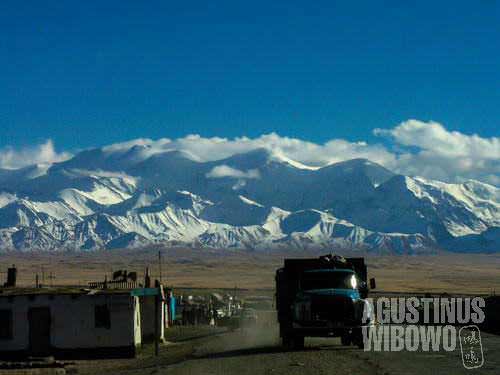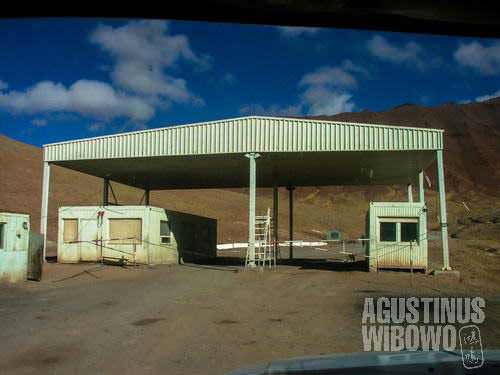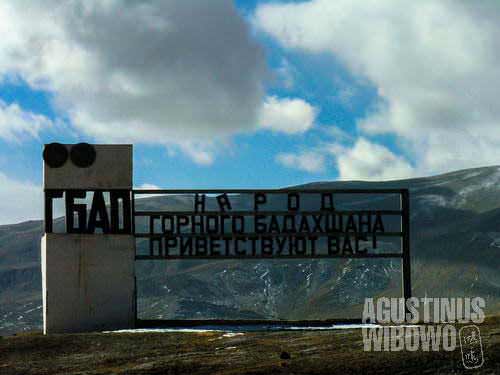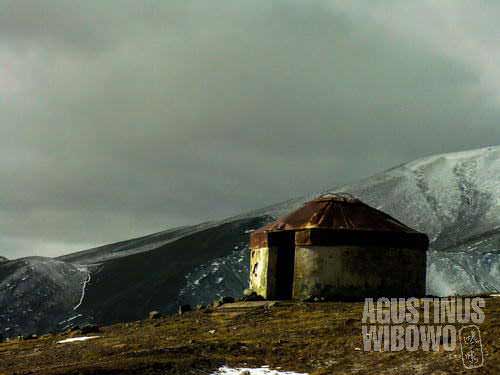Osh – Goodbye Tajikistan

Finally… the truck. And a new country
Maybe it was because of the falling stars.
When I woke up very early, about 7, as I couldn’t sleep at all the whole night, I saw two trucks were having custom check in Khurshid’s border post. These were trucks owned by Kyrgyz drivers from Kyrgyzstan. My Kyrgyz host helped me with a negotiation (‘chakchak’ in Tajik) with the drivers, and they agreed to take me as far as Sary Tash for 20 Somoni. Sary Tash would be the first Kyrgyzstan city to be approached from here.
I was not the only passengers of the trucks. There was already an old Kyrgyz man with his family. The trucks were taking sheep and yaks. The drivers didn’t have document to transport these animals to Kyrgyzstan, so the numerous checkpoints along the road had to be really fuelled by money to smooth up the way.
This is the way the business done. Tajikistan’s Pamir region is famous of its animal products, raised by the Kyrgyz and Pamiri Tajik herders. Animals are brought from the mountain areas in GBAO to the bazaar city of Osh in south Kyrgyzstan, where they may gain profit. Then to return back from Kyrgyzstan to Tajikistan, rather than traveling with empty load, the drivers usually prefer to get coal from southern mountains of Kyrgyzstan. Coal is very precious in Tajikistan Pamir, especially in cold winter time like this. The profit of this trade is quite big; enough to cover the oil price and even ‘fuelling money’ for the greedy officials.

Checkpoints, customs, and immigration are nightmare in bureacratic Tajikistan
The Tajik military officials along the road might have the most boring job on earth. They spent most time in their days in the tiny posts. Many of the posts were only inhabited by two men. There was not much work, as only less then a dozen trucks passing everyday. They sleep under thick blanket, smoke heavily, play chess, and share jokes with the passing drivers. Of course the happiest time is when ‘lubricant money’ is distributed after document check. But they always prevent me, a foreigner, to witness the infamous bribery.
The Tajik-Kyrgyz border is located on top of mountain. It is the Kyzyl Art (Red Back) Pass. It opens 24 hours a day, 7 days a week. The guards there have 10 days of duty and then 10 days off (picnic days in Khorog). The Tajik border looked like more a garage than an international border. They use cargo and oil tanks which transformed as an office. Living in a car house like this, even though not a mobile one, reminded me to the life of gypsies. But one should praise their efficiency, economical mind, and respected idea of waste recycling.
The officers in custom office were playing chess. They said they just saw a documentary about Indonesia and said it was a good country with much water. It seems that they have never experienced floods nor rainstorm. They looked at my documents and it was OK. Then it comes to the drivers’ documents. They didn’t have any document for the sheep and yak. Then it started with all of the bargaining of how much fine they have to pay. It was done in friendly way, but hurt the drivers quite much. They had to pay 150 Somoni.

Border-style welcome. It says, “The people of Mountainous Badakshan welcomes you”. Your first welcome here is from the soldiers. Prepare your money, please.
The Tajik custom officials then searched the trucks with the help of dogs to look for smuggled drugs. Then we went to another office, an ex-oil tank, the immigration office. Here I got my Tajik visa stamped, exactly on the day it expired. “Oh, if you come tomorrow, you will have to pay us 50 to 100 dollars,” smiled the police guy. It was not his lucky day then.
The Kyrgyz border is located 20 km away from this pass, in a post called as Bör Döbö. Here my passport was only seen at a glance, but they refused to stamp. “We don’t have stamp here!” said the officer to me in Russian. Just after crossing the border, the sphere of Tajik language influence evaporated immediately. Nobody here speaks Tajik except the command sentence of “injo biyo (come here)”. The officers told me as they don’t have stamps (?), it should be done from OVIR office in Osh.
The truck continued very slowly, and we arrived in Sary Tash almost dark. I am in money crisis now as I don’t have Kyrgyz money at all and nobody really wants the Tajik Somoni here. It was just less than a hundred kilometer away, my life had to be adjusted dramatically: from language, currency, and also food.

A yurt in the border, officially reminds you that you already arrived in the nomadic republic of Kyrgyzstan
It was the first time for me to taste the Kyrgyz/Kazakh national food, besh barmak. The name literally means ‘five fingers’, as traditionally it is eaten by the five fingers of hand. It is a noodle topped by slices of meat with sauce. Just a nomadic version of spaghetti. The meat can be as exotic as horse meat!
I decided to continue to Osh. We arrived in the outskirt of Osh at middle of night. I was sleeping in the trucks, and the guys asked me to get off. They threw me in the middle of the night, in the middle of nowhere. It is still far from the city, but the trucks couldn’t go any further. Luckily there was a cheap gostinitsa (hotel) near the road where the truck drivers threw me away. I slept automatically on the hard bed after the exhausting, long hauling 17 hour journey, exodus from Tajikistan.
Good bye, Tajikistan.





Leave a comment